Contents
- 1 1st Speech on Lal Bahadur Shastri (20 min)
- 2 2nd Speech on Lal Bahadur Shastri (15 min)
- 3 3rd Speech on Lal Bahadur Shastri (10 min)
- 4 4th Speech on Lal Bahadur Shastri (5 min)
- 5 5th Speech on Lal Bahadur Shastri (3 min)
- 6 FAQs related to Lal Bahadur Shastri
- 6.1 Who was Lal Bahadur Shastri?
- 6.2 What was Lal Bahadur Shastri’s contribution to India?
- 6.3 Why is Lal Bahadur Shastri considered a great leader?
- 6.4 What was Lal Bahadur Shastri’s famous slogan?
- 6.5 What did Lal Bahadur Shastri do for the welfare of farmers in India?
- 6.6 What was Lal Bahadur Shastri’s vision for India?
- 6.7 How can we remember Lal Bahadur Shastri’s legacy?
Looking for speech on Lal Bahadur Shastri? Edukar has the collection of 5 Best speeches on Lal Bahadur Shastri that covers the life, achievements and legacy of this inspiring Indian leader.
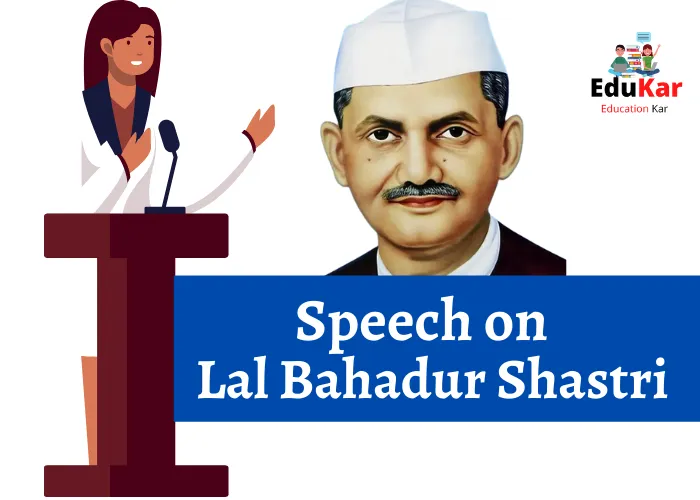
1st Speech on Lal Bahadur Shastri (20 min)
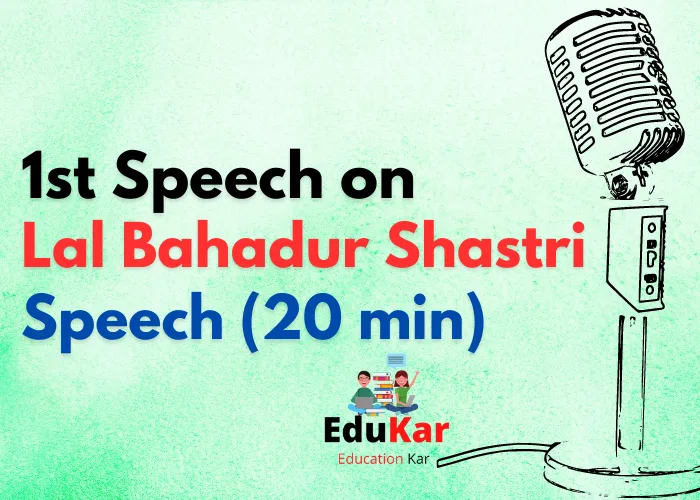
Respected teachers, honorable guests, and my dear fellow students,
Today I would like to talk about one of the greatest leaders of our country, Lal Bahadur Shastri. He was a man of great integrity and courage who dedicated his life to the betterment of his country and its people. Despite his humble beginnings, he was born to become the second Prime Minister of India and left behind a legacy that continues to inspire us to this day.
Lal Bahadur Shastri was born on October 2, 1904, in Mughalsarai, Uttar Pradesh. His father was a school teacher, and his mother was a homemaker. Due to financial problems, Shastri had to drop out of school after completing his primary education. However, he was determined to continue his studies and eventually graduated from Kashi Vidyapeeth in Varanasi.
Shastri’s entry into politics was not accidental. He was deeply influenced by Mahatma Gandhi’s teachings and philosophy, and he joined the Indian independence movement at a young age. In 1928, he was arrested for participating in the Salt Satyagraha and spent several months in jail. This experience only strengthened his resolve to fight for India’s freedom.
After India gained independence in 1947, Shastri became a prominent figure in the Congress Party. He was known for his honesty, simplicity, and dedication to the cause of the common man. In 1951, he was appointed as the Minister of Police and Transport in the Uttar Pradesh government. He worked tirelessly to improve the state’s law and order situation and introduced several reforms to make public transport safer and more efficient.
Shastri’s rise to national prominence came during the 1960s when he served as the Minister of Home Affairs and later as the Minister of External Affairs. In 1964, he was appointed as the Prime Minister of India after the sudden demise of Jawaharlal Nehru. Shastri’s tenure as Prime Minister was marked by several significant events that shaped the course of India’s history.
One of the most notable achievements of Shastri’s tenure was his leadership during the 1965 India-Pakistan War. Despite being vastly outnumbered and outgunned, Shastri refused to back down and ordered Indian troops to cross the international border into Pakistan. His famous slogan “Jai Jawan Jai Kisan” became a rallying cry for the nation, as he urged both soldiers and farmers to work together to defend the country.
Shastri was also a strong advocate of self-sufficiency and worked tirelessly to promote the Green Revolution. He introduced several measures to increase agricultural productivity and reduce India’s dependence on food imports. He also encouraged the use of scientific methods and technology to improve farming practices.
Unfortunately, Shastri’s tenure as Prime Minister was cut short when he passed away in Tashkent, Uzbekistan, on January 11, 1966. His sudden death was a great loss to the nation, and his legacy continues to inspire us to this day. His personal values of simplicity, honesty, and selflessness, as well as his commitment to the welfare of the common man, have become a source of inspiration for generations to come.
In the end, Lal Bahadur Shastri was a great leader and a true patriot. He dedicated his life to the service of his country and its people and left behind a legacy that continues to inspire us to this day. His values and principles serve as a reminder of the importance of honesty, integrity, and selflessness in public life, and his contributions to India’s development will always be remembered with pride.
Also See: Speech on Bhagat Singh
2nd Speech on Lal Bahadur Shastri (15 min)
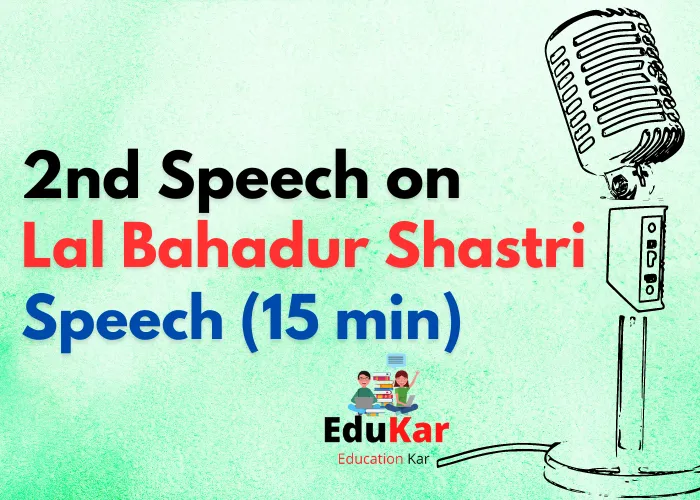
Respected Principal, Teachers, and my dear friends,
Today, I am here to deliver a speech on one of the most revered personalities in the history of India, Lal Bahadur Shastri. Lal Bahadur Shastri was the second Prime Minister of India who served the nation from 1964 to 1966. He was a true patriot, a great leader, and an honest politician who dedicated his life to the service of the nation.
Lal Bahadur Shastri was born on October 2, 1904, in Mughalsarai, Uttar Pradesh. His parents, Sharada Prasad Shrivastava and Ramdulari Devi, were poor, and Lal Bahadur Shastri had to face many hardships during his childhood. However, his determination and hard work helped him overcome all the obstacles in his way, and he went on to become one of the greatest leaders India has ever produced.
Lal Bahadur Shastri’s contribution to the freedom struggle of India is immense. He actively participated in the Non-Cooperation Movement and the Civil Disobedience Movement led by Mahatma Gandhi. He was jailed several times for his participation in these movements.
Lal Bahadur Shastri was a man of principles, and he believed in leading a simple and honest life. He was known for his honesty and integrity, and he never compromised on his principles. Even after becoming the Prime Minister of India, he continued to live a simple and humble life.
As the Prime Minister of India, Lal Bahadur Shastri faced many challenges, but he was always ready to take bold and decisive actions. One of his most significant contributions was in the field of agriculture. He initiated the Green Revolution, which led to a significant increase in the production of food grains in the country. This, in turn, helped India become self-sufficient in food production.
Lal Bahadur Shastri was also a great advocate of peace, and he believed in resolving conflicts through peaceful means. During his tenure as Prime Minister, he faced several challenges on the international front, but he always worked towards maintaining friendly relations with other countries. He was instrumental in signing the Tashkent Agreement, which brought an end to the 1965 Indo-Pak war.
Lal Bahadur Shastri’s leadership was characterized by his humility, simplicity, and vision for a better India. He always put the nation’s interest above his personal interests and worked tirelessly for the betterment of the country. His famous slogan, “Jai Jawan, Jai Kisan,” is still remembered and followed by many.
However, Lal Bahadur Shastri’s tenure as Prime Minister was cut short due to his untimely death on January 11, 1966. He died in Tashkent, Uzbekistan, where he had gone to sign the Tashkent Agreement with the then President of Pakistan, Ayub Khan. His death was a great loss to the nation, and India mourned the loss of a great leader.
At the end, Lal Bahadur Shastri was a great leader and a true patriot who dedicated his life to the service of the nation. He was a man of principles and believed in leading a simple and honest life. His contributions to the freedom struggle of India and his leadership as the Prime Minister of India will always be remembered. Lal Bahadur Shastri’s life and teachings continue to inspire millions of people, and he will always be remembered as one of the greatest leaders India has ever produced.
Thank you.
Also See: Speech on APJ Abdul Kalam
3rd Speech on Lal Bahadur Shastri (10 min)
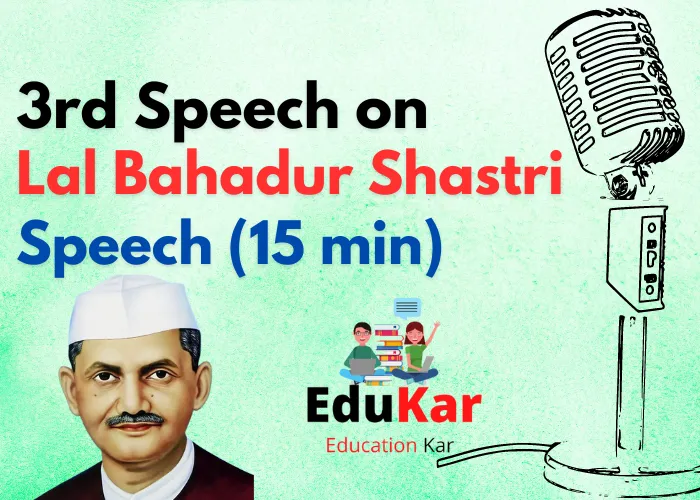
Respected Teachers and My Dear Friends,
Today, I stand before you to talk about one of the greatest leaders of our country, Lal Bahadur Shastri. He was a man of simplicity and integrity who dedicated his entire life to serve the nation. He played a significant role in the Indian independence movement and later became the second Prime Minister of India.
Lal Bahadur Shastri was born on 2nd October 1904 in Mughalsarai, Uttar Pradesh. His father was a school teacher, and he belonged to a middle-class family. Shastriji’s childhood was full of hardships, and he had to struggle a lot to complete his education. Despite facing many obstacles, he never gave up on his dreams and always remained determined to achieve his goals.
Shastriji joined the Indian independence movement at a young age and was actively involved in various activities to oppose British rule in India. He was a follower of Mahatma Gandhi and was deeply influenced by his philosophy of non-violence. He participated in the Salt Satyagraha and spent several months in jail during the freedom struggle.
After India gained independence in 1947, Shastriji held various important positions in the government. He served as the Minister of Railways, Minister of Commerce, and Industry, and also as the Home Minister of India. In 1964, after the sudden demise of India’s first Prime Minister Jawaharlal Nehru, Shastriji was appointed as the Prime Minister of India.
As the Prime Minister of India, Lal Bahadur Shastri faced many challenges. India was facing a severe food shortage, and the country was on the brink of a famine. Shastriji took several measures to increase food production and launched the ‘Green Revolution’ to boost agricultural productivity in the country. He encouraged the use of high-yielding crop varieties, modern farming techniques, and also promoted the use of chemical fertilizers.
Shastriji’s famous slogan “Jai Jawan Jai Kisan” became a rallying cry for the entire nation. He emphasized the importance of the armed forces and the farmers in the development of the country. Shastriji was a man of great principles, and he always put the interests of the nation above everything else. He was known for his honesty, simplicity, and his ability to connect with the common people.
During his tenure as the Prime Minister, India faced a severe military conflict with Pakistan in 1965. Shastriji showed great courage and determination during the war, and his leadership inspired the entire nation. Despite the difficult circumstances, he never lost his cool and always remained calm and composed.
Shastriji’s legacy is not only limited to his contribution to the freedom struggle or his tenure as the Prime Minister. He was a great human being who believed in the principles of equality and social justice. He fought against discrimination based on caste, creed, and religion and worked towards creating a more inclusive society.
In the end, Lal Bahadur Shastri was a true patriot, a visionary leader, and a man of great character. His life and achievements continue to inspire millions of people across the world. On this occasion, let us remember his contributions to the nation and pledge to work towards creating a better future for all.
Thank You, Jai Hind!
Also See: Speech on Jawaharlal Nehru
4th Speech on Lal Bahadur Shastri (5 min)
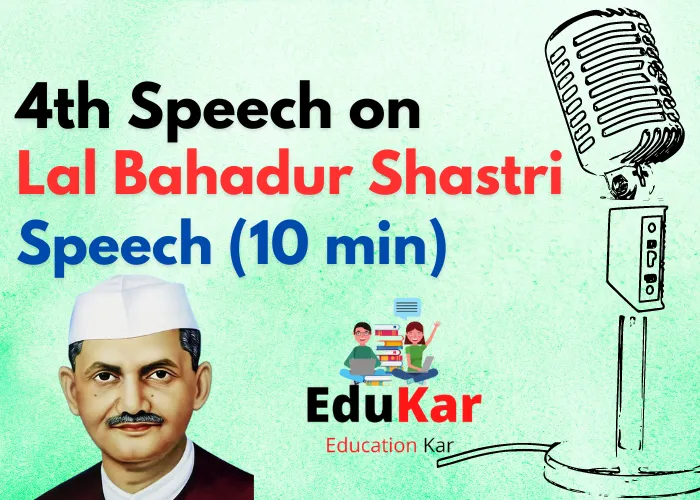
Respected Teachers and Dear Friends,
Today, I stand before you to speak about a great leader of India, Lal Bahadur Shastri. He was the second Prime Minister of India, and he served the nation with great distinction and dedication.
Lal Bahadur Shastri was born on 2nd October 1904, in Mughalsarai, Uttar Pradesh. His parents were Sharada Prasad Shrivastava and Ramdulari Devi. His father was a school teacher, and he instilled in Shastriji the values of honesty, hard work, and self-reliance. Lal Bahadur Shastriji was a bright student, and he had a keen interest in literature, politics, and social issues.
Shastriji’s journey in public life began when he joined the Indian independence movement as a teenager. He was inspired by the teachings of Mahatma Gandhi and he took part in various protests and campaigns against British rule. He was arrested several times, but he never wavered in his commitment to the cause of Indian independence.
After India gained independence in 1947, Lal Bahadur Shastriji became a prominent figure in Indian politics. He was known for his simplicity, humility, and integrity. He served in various positions in the Indian government, including Minister of Railways, Minister of Commerce and Industry, and Minister of Home Affairs.
In 1964, Lal Bahadur Shastriji became the Prime Minister of India, succeeding Jawaharlal Nehru. His tenure as Prime Minister was marked by his focus on improving the lives of ordinary people. He initiated the famous slogan “Jai Jawan, Jai Kisan,” which means “Hail the Soldier, Hail the Farmer.” This slogan reflected his commitment to the welfare of farmers and soldiers, who he believed were the backbone of the country.
During his tenure as Prime Minister, Shastriji faced several challenges, including the Indo-Pakistani War of 1965. He showed great leadership and courage during the war, and his famous phrase “Jai Jawan, Jai Kisan” became a rallying cry for the nation.
One of Lal Bahadur Shastri’s most significant contributions to India was his role in the Green Revolution. He encouraged the use of modern agricultural techniques and technology, which led to a significant increase in agricultural production in India. This helped to reduce food shortages and improve the lives of millions of farmers.
Lal Bahadur Shastriji was a man of great simplicity and humility. He lived a simple life and believed in serving the people of India with honesty and dedication. He was a true patriot who always put the interests of the nation above his own.
Sadly, Lal Bahadur Shastriji’s tenure as Prime Minister was very short. He passed away on 11th January 1966, under mysterious circumstances in Tashkent, Uzbekistan. However, his legacy lives on, and he is remembered as one of the greatest leaders in Indian history.
Finally, Lal Bahadur Shastri was a great leader who devoted his life to the service of the people of India. He was a man of great integrity, simplicity, and humility, and his contributions to India’s growth and development are immeasurable. As we remember him today, let us pledge to follow in his footsteps and work towards making India a better and stronger nation.
Thank you, Jai Hind
Also See: Speech on Shivaji Maharaj
5th Speech on Lal Bahadur Shastri (3 min)
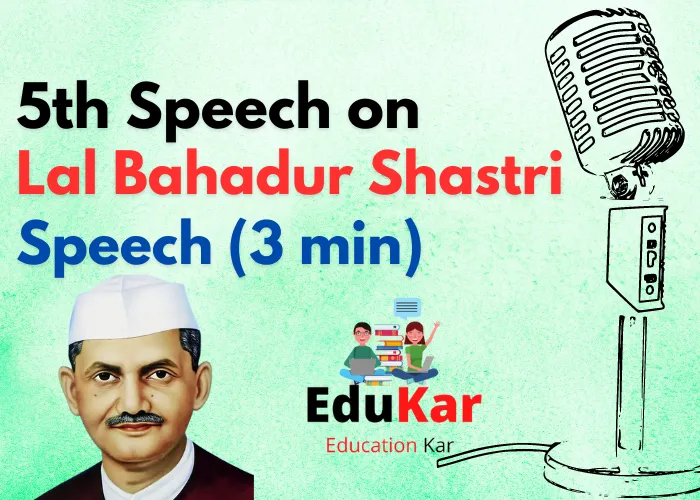
Respected Teachers and my dear fellow students,
Today, I want to talk about one of the most remarkable and inspiring leaders of our country – Lal Bahadur Shastri. Born in 1904 in Uttar Pradesh. He lost his father at a young age, and the responsibility of supporting his family fell on his shoulders. Despite the many challenges he faced, he pursued his education and went on to become one of the most respected leaders in Indian history.
Shastriji’s contribution to India’s struggle for independence is invaluable. He participated in various movements led by Mahatma Gandhi, including the Salt Satyagraha and Quit India Movement. He spent a considerable amount of time in jail, where he continued to fight for India’s freedom. After India gained independence, Shastriji became a prominent leader of the Congress party.
As India’s second Prime Minister, Lal Bahadur Shastriji made many significant contributions to the country’s progress. He was a man of simple living and high thinking, and his humility was reflected in his policies. Shastriji’s leadership during the 1965 Indo-Pak war is particularly noteworthy. Despite the odds stacked against India, he led the country to a decisive victory.
Shastriji’s famous slogan ‘Jai Jawan, Jai Kisan’ (Hail the soldier, Hail the farmer) captured the essence of his vision for India’s growth. He recognized the importance of both the agricultural and defense sectors in India’s progress and worked towards their development. He implemented several policies that aimed to increase agricultural productivity, including the Green Revolution. He also initiated the development of India’s defense capabilities, including the establishment of the Defense Research and Development Organization (DRDO).
Shastriji’s contributions to India’s progress were not limited to these sectors. He was also a strong advocate of gender equality and women’s empowerment. He encouraged women to participate in politics and recognized their contributions to society. He promoted the establishment of women’s colleges and supported the formation of the National Commission for Women.
Despite his short tenure as Prime Minister, Lal Bahadur Shastriji left an indelible mark on India’s history. He was a leader who put the interests of the country before his own and worked tirelessly for India’s progress. His dedication, simplicity, and humility continue to inspire us even today.
On this occasion, let us remember the contribution of this great leader and strive to emulate his values in our lives. Let us work towards making India a stronger, more prosperous, and more equitable nation. Let us all say together – Jai Hind!
Also See: Speech on Subhash Chandra Bose
Who was Lal Bahadur Shastri?
Lal Bahadur Shastri was the second Prime Minister of India. He served as the Prime Minister from 1964 to 1966.
What was Lal Bahadur Shastri’s contribution to India?
Lal Bahadur Shastri was a great leader who played a significant role in India’s independence movement. He also introduced several important policies during his tenure as Prime Minister, including the Green Revolution, which helped India to become self-sufficient in food production. He also led India during the 1965 war with Pakistan.
Why is Lal Bahadur Shastri considered a great leader?
Lal Bahadur Shastri was a great leader because he had a deep sense of integrity and was known for his honesty and simplicity. He was a man of great vision and had a deep commitment to the welfare of the people of India.
What was Lal Bahadur Shastri’s famous slogan?
Lal Bahadur Shastri’s famous slogan was “Jai Jawan Jai Kisan,” which means “Hail the soldier, Hail the farmer.”
What did Lal Bahadur Shastri do for the welfare of farmers in India?
Lal Bahadur Shastri introduced several policies for the welfare of farmers in India, including the Green Revolution, which aimed at increasing agricultural productivity through the use of high-yielding varieties of seeds, fertilizers, and irrigation. He also introduced several measures to provide financial assistance to farmers, such as crop insurance and credit facilities.
What was Lal Bahadur Shastri’s vision for India?
Lal Bahadur Shastri had a vision of a strong and self-reliant India. He believed in the power of agriculture and wanted to make India self-sufficient in food production. He also believed in social justice and worked towards the upliftment of the poor and marginalized sections of the society.
How can we remember Lal Bahadur Shastri’s legacy?
We can remember Lal Bahadur Shastri’s legacy by following his principles of honesty, integrity, and simplicity. We can also work towards the welfare of farmers and the poor, and contribute to the development of India. We can also pay homage to him on his birth and death anniversaries.

![5 Best Speech on APJ Abdul Kalam [Short & Long] APJ Abdul Kalam Speech](https://edukar.in/wp-content/uploads/2023/03/APJ-Abdul-Kalam-Speech.webp)
![5 Best Speech on Jawaharlal Nehru[Short & Long] Jawaharlal Nehru Speech](https://edukar.in/wp-content/uploads/2023/03/Jawaharlal-Nehru-Speech.webp)
![5 Best Speech on Shivaji Maharaj [Short & Long] Speech on Shivaji Maharaj](https://edukar.in/wp-content/uploads/2023/03/Speech-on-Shivaji-Maharaj.webp)
![5 Best Speech on Bhagat Singh [Short & Long] Bhagat Singh Speech](https://edukar.in/wp-content/uploads/2023/03/Bhagat-Singh-Speech.webp)
![Speech On Swami Vivekananda [Short & Long] Speech On Swami Vivekananda](https://edukar.in/wp-content/uploads/2023/03/Speech-On-Swami-Vivekananda.webp)
![Speech on Mahatma Gandhi [Short & Long] Speech on Mahatma Gandhi](https://edukar.in/wp-content/uploads/2023/03/Speech-on-Mahatma-Gandhi.webp)

![5 Best Global Warming Speech [Short & Long] Global Warming Speech](https://edukar.in/wp-content/uploads/2023/03/Global-Warming-Speech.webp)
![5 Best Speech on Clean India [Short & Long] Speech on Clean India](https://edukar.in/wp-content/uploads/2023/03/Speech-on-Clean-India.webp)
![Speech about Nature [Short & Long] Speech about Nature](https://edukar.in/wp-content/uploads/2023/03/Speech-about-Nature.webp)
![Speech on Cleanliness [Short & Long] Speech on Cleanliness](https://edukar.in/wp-content/uploads/2023/03/Speech-on-Cleanliness.webp)

![Speech on Success [Short & Long] Speech on Success](https://edukar.in/wp-content/uploads/2023/03/Speech-on-Success.webp)

![5 Best Speech on Water [Short & Long] Speech on Water](https://edukar.in/wp-content/uploads/2023/03/Speech-on-Water.webp)
